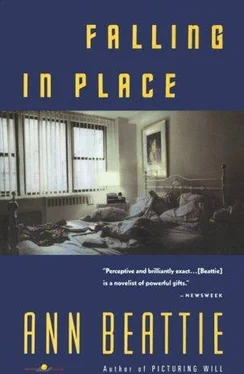Ann Beattie - Falling in Place
Здесь есть возможность читать онлайн «Ann Beattie - Falling in Place» весь текст электронной книги совершенно бесплатно (целиком полную версию без сокращений). В некоторых случаях можно слушать аудио, скачать через торрент в формате fb2 и присутствует краткое содержание. Год выпуска: 1991, Издательство: Vintage, Жанр: Современная проза, на английском языке. Описание произведения, (предисловие) а так же отзывы посетителей доступны на портале библиотеки ЛибКат.
- Название:Falling in Place
- Автор:
- Издательство:Vintage
- Жанр:
- Год:1991
- ISBN:нет данных
- Рейтинг книги:4 / 5. Голосов: 1
-
Избранное:Добавить в избранное
- Отзывы:
-
Ваша оценка:
- 80
- 1
- 2
- 3
- 4
- 5
Falling in Place: краткое содержание, описание и аннотация
Предлагаем к чтению аннотацию, описание, краткое содержание или предисловие (зависит от того, что написал сам автор книги «Falling in Place»). Если вы не нашли необходимую информацию о книге — напишите в комментариях, мы постараемся отыскать её.
Falling in Place — читать онлайн бесплатно полную книгу (весь текст) целиком
Ниже представлен текст книги, разбитый по страницам. Система сохранения места последней прочитанной страницы, позволяет с удобством читать онлайн бесплатно книгу «Falling in Place», без необходимости каждый раз заново искать на чём Вы остановились. Поставьте закладку, и сможете в любой момент перейти на страницу, на которой закончили чтение.
Интервал:
Закладка:
It had to be that she was leaving him, or asking him to leave her, because why else would she call him at the office and say with that grave tone of voice — that was it, she had sounded grave —that she wanted to see him right away? That night. Tonight. He had been so anxious to face it that he hadn’t even called Nina, as he did every night. He would stop on the way, at a phone. He would just not tell her that it was happening, not until it was all over. He hoped that he and Louise could discuss it tonight, and then the rest of it would be legal technicalities: It would actually be over. The closer he got to the house in Connecticut, the more he doubted it. If she did not want a divorce, though, what could she want on a Tuesday night? What could she want that she couldn’t talk about on the phone?
He smiled to himself, remembering telling Nina that there were pillars at the base of his driveway. There were no pillars, but at the foot of his driveway was a police car parked sideways, blocking the way. He had been about to turn into the driveway without even thinking, and it had taken a few seconds to register that he couldn’t, and another few seconds to register that the black car was a police car. He got out of his car, but he could only stand and stare. He left the engine running, and reached back in through the window to set his hazard light blinking. If it was anything horrible, she would have told him on the phone. She was calm on the phone. But there was no way that a police car blocking his driveway could mean anything good. He walked around it. Two men with walkie-talkies were in his backyard: men in dark suits, standing back by the tree. They looked at him and didn’t say anything. He said nothing to them. The back door was open. If it was something really awful, and if she had not let on, if she had made him walk into it this way deliberately, he was going to kill her. Then he thought, suddenly: Is she dead?
A man with a camera was sitting behind his kitchen table. The camera was beside him on the table and the man, with a can of Coke in front of him, was sitting there with his elbows on the table and his hands cupped one on top of the other, and his chin on his hands. “Who are you?” he said, when John walked in.
“Where’s Louise?” he said. The house was so quiet. So cool, without any air conditioning. He saw a raw chicken, in a roasting pan, on the stove. Plates and glasses and silverware had been pushed aside so the man could lean on the table and drink his Coke. From outside, a buzz from the walkie-talkies droned on, what sounded like a doorbell with a short in it, a doorbell that kept ringing on its one note, maddeningly.
A policeman came into the room, followed by Tiffy Adamson.
“Is she dead?” he said to Tiffy. He knew that he had spoken, but he couldn’t hear his words. The man sitting at the table got up, picked up his Coke can, held it.
“No,” Tiffy said. She sank into a chair across the table from him. He sat in the chair the man had been sitting in, and they faced each other across the table. You sat like this when you visited someone in prison. When you took a seminar in college. When you were at a real estate agent’s buying a house. The policeman stood in back of Tiffy and kept looking over his shoulder.
“There was a shooting,” the policeman said to John. “She isn’t dead. She’s been taken to the hospital.”
“Louise?” he said. “I just talked to Louise. Louise shot herself?”
“No,” Tiffy said. “Louise is all right. Mary was shot.” Tiffy started to cry. “I’m sorry,” she said.
“Mary?” he said stupidly.
“Put your face between your knees,” the policeman said.
“Do what?” he said.
“You’re going to faint. Put your head down. Put it down.”
He put it down. He felt his cheeks prickling. Surely Louise wouldn’t calmly call him when Mary had been shot? That simply wasn’t possible. They were tricking him.
“Where’s Louise?” he said. It was hard to talk with his head down between his knees. He felt his Adam’s apple pulsing.
“At the hospital,” Tiffy said. “Do you want me to call them for you? She’s not going to die. They had to operate to remove the bullet.”
“What bullet?” he said.
“Put your head down,” the policeman said.
“John Joel shot her,” Tiffy said. She bit her lip, stared at him. He put his head down. She was the last thing he saw. He saw her face, and it shimmered, and then it slowly started to darken as his face got hotter and hotter. He tried to look at his own hands, holding the edge of the table, knowing that if he could blink, if he could break his stare, that he could also breathe, and if he could breathe he wouldn’t pass out. He thought he heard someone talking to him, faintly, and decided that he was talking to himself. The weight he felt was Tiffy’s hands, one on each shoulder, pushing him down into the chair so hard that he thought he would fall through it to the floor. He was still staring, but at nothing — at the refrigerator, the refrigerator in back of where Tiffy had been sitting. So that the refrigerator was actually the last thing he saw, and then when he opened his eyes the first thing he saw again was Tiffy. He saw a glass of water in front of him, with ice in it. He heard the policeman saying that it could have been worse, and he was confused: Had Tiffy called the hospital, and had he talked to Louise? Had Louise really called him and said only that she wanted him to come home? She hadn’t even insisted that he come.
He said to Tiffy: “She called me this afternoon. I just talked to her.”
“She must have called you before it happened,” Tiffy said. Tiffy looked at her watch. “It just happened,” she said. “It didn’t even happen three hours ago.”
“Did you call the hospital?” he said.
“No,” she said. “Is that what you want me to do?”
“What are you doing here?” he said.
“It’s crazy,” she said, “but I was driving by — I’d made strawberry muffins with the berries we picked the other day and I was bringing them. I walked into the kitchen, and we started to talk, and then we heard it.”
“No,” he said.
“Yes,” Tiffy said. “Really.”
“Drink the water,” the policeman said. “Drink it so we can ask you some questions. Are you all right?”
“No,” he said again.
“Put your head down,” the policeman said.
“I’m so sorry,” Tiffy said. “What happened?”
Tiffy was asking him what happened. One of the men with the walkie-talkies came into the kitchen and opened the refrigerator and took an ice cube out of the bin inside the freezer compartment. “You left your car running,” he said to John. “I turned it off.” He ran the ice cube over his face and neck, dropped it in the sink.
“The gawkers are starting to show,” he said.
“No,” he said. He heard a buzz on the walkie-talkie, and then everything went still, and silent. He heard himself breathing.
“Jesus God,” the man in the suit sighed. “Do I get tired of gawkers.”
“Get out there and chase them off,” the policeman said. He had a notebook open. He was sitting where Tiffy had sat, and he had opened a notebook. Before him was a perfectly blank page.

Tiffy was still there when he and Louise got back from the hospital after midnight. They had given Louise a shot of something, and made her take a pill, and given him more pills to give her later, and he had been horrified that they were going to over-medicate her and that she would die right there in the hospital. The doctors asked if he was all right. The police offered to drive them home. He said that they were fine. He agreed to talk to the police more the next day. Mary was in bed, a bullet removed from her side, and John Joel was there too, on a different floor of the hospital. He had thought that his wife was going to ask for a divorce. Nick had thought that she was going to ask for a fur coat. What had happened was that while his wife was talking to Tiffy Adamson and stuffing chicken to put in the oven, his son had shot his daughter — with a gun he had gotten from Parker, apparently. A gun he had fired a shot with, then dropped on the ground. Then John Joel and Parker had climbed down from the tree and were standing there, looking no more amazed than children caught stealing cookies from a jar. Louise had opened the back door, and there they had stood, and Mary was on the ground .
Читать дальшеИнтервал:
Закладка:
Похожие книги на «Falling in Place»
Представляем Вашему вниманию похожие книги на «Falling in Place» списком для выбора. Мы отобрали схожую по названию и смыслу литературу в надежде предоставить читателям больше вариантов отыскать новые, интересные, ещё непрочитанные произведения.
Обсуждение, отзывы о книге «Falling in Place» и просто собственные мнения читателей. Оставьте ваши комментарии, напишите, что Вы думаете о произведении, его смысле или главных героях. Укажите что конкретно понравилось, а что нет, и почему Вы так считаете.












